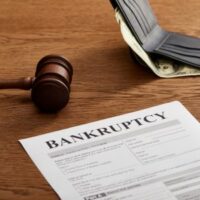Will My Co-Signer Be Responsible For Debt If I File For Bankruptcy?

If you are struggling with overwhelming debt, filing bankruptcy might be an option for you. People often choose Chapter 7 bankruptcy because the process is quick and because Chapter 7 bankruptcy enables you to have your debts discharged/forgiven. However, if you are not eligible for Chapter 7 bankruptcy, you can benefit from filing a Chapter 13 bankruptcy. When you file a Chapter 13 bankruptcy, you can pay off your debts over a period of time, usually 3 to 5 years. With that said, if you have a co-signer on any of your debts, you need to know how your decision to file for bankruptcy may affect them.
Who Is a Co-signer?
A co-signer is responsible for paying back your debt just as you, the borrower, are obligated to pay. Lenders are sometimes only willing to give out a loan if the borrower can get another person to agree to be responsible for the debt.
There are many reasons why people need co-signers. For example, a bank might need you to have a cosigner if;
- Your credit is not perfect.
- You do not have enough credit history that can be used to judge your ability to pay back the loan.
- You want the bank to give you more money than you can afford to repay.
- You cannot put up collateral to secure the loan.
Having a co-signer can offer you several benefits. For example, if you have a cosigner, you may get a better interest rate. On the other hand, your co-signer may face several risks. If you fail to repay your loan, your co-signer will be responsible for repayment.
Will My Co-signer Be Responsible for Debt if I File for Bankruptcy?
If you file a Chapter 7 bankruptcy, all collection efforts against you must stop because of the automatic stay. However, the automatic stay will not extend to your co-signer. Therefore, if you file a Chapter 7 bankruptcy, your co-signer may be pursued by creditors.
If you do not want creditors to keep pursuing your co-signer after filing a Chapter 7 bankruptcy, there are some steps you can take. However, before you take any step, talk to an attorney.
- Reaffirm the debt – Reaffirming a debt means that you give up the benefit of your discharge and make yourself personally responsible for the debt again. Before receiving a Chapter 7 discharge, you can reaffirm secured debts like mortgages and car loans.
Note: It is usually not advisable to reaffirm a debt unless you need the asset.
- Pay off the debt – After a Chapter 7 discharge, you can choose to voluntarily pay off a particular debt to protect a co-signer. But, unless you can make payment in a lump sum, you will need to negotiate a payment plan with the creditor.
On the other hand, Chapter 13 bankruptcy offers more protection to co-signers. When you file Chapter 13 bankruptcy, the “codebtor stay” protects your co-signer. However, if, for example, you are not proposing to pay off the debt in full through your Chapter 13 payment plan, your co-signer may remain liable for your debt. Also, if your bankruptcy case is dismissed, the codebtor stay will end.
Contact a Pennsylvania Bankruptcy Attorney for Legal Help
If you are considering bankruptcy and feel concerned about its effect on a co-signer, contact an experienced Lehighton & Carbon County bankruptcy attorney at Adam R. Weaver, Esq.
Resource:
law.cornell.edu/uscode/text/11/1301
